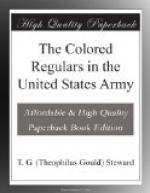Black officers and white officers commanded side by side, moving among the men to prompt their valor by word and example, revealing no difference in their equal contempt of death. Captain Quinn, of the Third Regiment, with forty reckless followers, bearing their rifles and cartridge boxes above their heads, swam the ditch and leaped among the guns, when they were ordered back to escape a regiment of rebels hastening for their rear. Six of them re-crossed alive, and of these only two were unhurt, the brave Quinn and a Lieutenant. The gallant Captain Andre Cailloux, who commanded the color company of the First Louisiana, a man black as night, but a leader by birth and education, moved in eager zeal among his men, cheering them on by words and his own noble example, with his left arm already shattered, proudly refusing to leave the field. In a last effort of heroism, he sprang to the front of his company, commanded his men to follow him, and in the face of that murderous fire, gallantly led them forward until a shell smote him to death but fifty yards from the works.
Cailloux, a pure Negro in blood, was born a freeman and numbered generations of freemen among his ancestry. He had fine presence, was a man of culture and possessed wealth. He had raised his company by his own efforts, and attached them to him, not only by his ardent pride of race, which made him boast his blackness, but also by his undoubted talents for command. His heroic death was mourned by thousands of his race who had known him. His body, recovered after the surrender, was given a soldier’s burial in his own native city of New Orleans.
When the day was spent, the bleeding and shattered column was at length recalled. The black troops did not take the guns, but the day’s work had won for them a fame that cannot die. The nation, which had received them into the service half-heartedly, and out of necessity, was that day made to witness a monotony of gallantry and heroism that compelled everywhere awe and admiration. Black soldiers, and led by black officers as well as white, assigned a task hopeless and impossible at the start, had plunged into that withering storm of shot and shell, poured fourth by artillery and infantry, charging over a field strewn with obstacles, and in madness of bravery had more than once thrown the thin head of their column to the very edge of the guns. They recoiled only to reform their broken lines and to start again their desperate work. When the day was gone, and they were called back, the shattered remnant of the column which had gone forth in the morning still burned with passion. With that day’s work of black soldiers under black officers, a part forever of the military glory of the Republic, there are those who yet dare to declare that Negroes cannot command.




